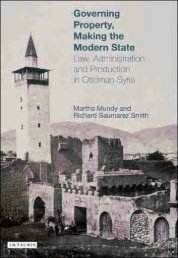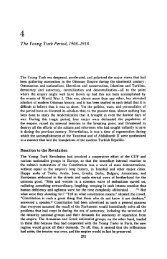Legal borrowing and its impact on Ottoman legal culture in ... - PSI424
Legal borrowing and its impact on Ottoman legal culture in ... - PSI424
Legal borrowing and its impact on Ottoman legal culture in ... - PSI424
Create successful ePaper yourself
Turn your PDF publications into a flip-book with our unique Google optimized e-Paper software.
AVI RUBIN<br />
20 S¸erif Mard<strong>in</strong>, The genesis of Young <strong>Ottoman</strong> thought: a study <strong>in</strong> the modernizati<strong>on</strong> of<br />
Turkish political thought (Pr<strong>in</strong>cet<strong>on</strong>, 1962).<br />
21 Joseph Schacht, An <strong>in</strong>troducti<strong>on</strong> to Islamic law (Oxford, 1964), 92. For a list of articles<br />
<strong>in</strong> the Mecelle that are analogous to the French Civil Code, see Demetrius Nicolaides,<br />
Legislati<strong>on</strong> <strong>Ottoman</strong>e: septieme partie c<strong>on</strong>tenant le Code Civil <strong>Ottoman</strong>, livres IX–XVI<br />
(C<strong>on</strong>stant<strong>in</strong>ople, 1888).<br />
22 Majid Khadduri <str<strong>on</strong>g>and</str<strong>on</strong>g> Herbert Liebensky eds., Law <strong>in</strong> the Middle East (Wash<strong>in</strong>gt<strong>on</strong> DC,<br />
1955), 295–6.<br />
23 This is not to say that kadıs enjoyed unlimited leeway <strong>in</strong> their discreti<strong>on</strong>, as Weber<br />
mistakenly assumed. As was dem<strong>on</strong>strated by Gerber, the Shar’i judges had an identifiable<br />
pool of sources to which they resorted. See Haim Gerber, State, society, <str<strong>on</strong>g>and</str<strong>on</strong>g> law<br />
<strong>in</strong> Islam (Albany, 1996). Nevertheless, the Mecelle forced the judges of the Nizamiye<br />
courts to b<strong>in</strong>d their rul<strong>in</strong>gs to a s<strong>in</strong>gle <strong>legal</strong> st<str<strong>on</strong>g>and</str<strong>on</strong>g>ard.<br />
24 _Ibnulem<strong>in</strong> Mahmut Kemal _Inal, Osmanlı Devr<strong>in</strong>de s<strong>on</strong> Sadraˆzamlar (Istanbul, 1953),<br />
989.<br />
25 Du¨stur (official <strong>Ottoman</strong> collecti<strong>on</strong> of laws <str<strong>on</strong>g>and</str<strong>on</strong>g> regulati<strong>on</strong>s), First Series (Istanbul,<br />
1879–1908), vol. 4, 260.<br />
26 For a pi<strong>on</strong>eer<strong>in</strong>g study of the implicati<strong>on</strong> of the procedural reforms <strong>in</strong> the Shari’a<br />
courts, see Iris Agm<strong>on</strong>, ‘Record<strong>in</strong>g procedures <str<strong>on</strong>g>and</str<strong>on</strong>g> <strong>legal</strong> <strong>culture</strong> <strong>in</strong> the late <strong>Ottoman</strong><br />
Sharia Court of Jaffa, 1865–1890’, Islamic Law <str<strong>on</strong>g>and</str<strong>on</strong>g> Society 11 (2004).<br />
27 George Young’s translati<strong>on</strong> of the procedural codes is helpful <strong>in</strong> compar<strong>in</strong>g between<br />
the French versi<strong>on</strong>s <str<strong>on</strong>g>and</str<strong>on</strong>g> the <strong>Ottoman</strong> <strong>on</strong>es, as he provides the numbers of the corresp<strong>on</strong>d<strong>in</strong>g<br />
French articles. See George Young, Corps de droit ottoman; recueil des codes,<br />
lois, re´glements, ord<strong>on</strong>nances et actes les plus importants du droit <strong>in</strong>te´rieur, et d’e´tudes sur<br />
le droit coutumier de l’Empire ottoman, vol. 7 (Oxford, 1905–1906).<br />
28 Du¨stur, First Series, vol. 4, 225–35.<br />
29 Hifzi Veldet Velideoĝlu, ‘Kanunlas¸tırma Hareketleri ve Tanzimat’, Tanzimat, vol. 1<br />
(Istanbul, 1940), 198.<br />
30 Du¨stur, First Series, I, vol. 4, 131–224.<br />
31 Bas¸bakanlık Osmanlı Ars¸ıvı, Istanbul (The Prime M<strong>in</strong>ister’s Archive <strong>in</strong> Istanbul-<br />
<strong>Ottoman</strong> Secti<strong>on</strong>; hereafter BOA), _I.DH. 740/60556.<br />
32 On the reformed <strong>in</strong>stituti<strong>on</strong> of naibship, see Akiba, ‘From kadi to naib’<br />
33 Accord<strong>in</strong>g to Miller, ‘the civil secti<strong>on</strong>s rema<strong>in</strong>ed Islamic law courts, <str<strong>on</strong>g>and</str<strong>on</strong>g> naibs, tra<strong>in</strong>ed<br />
<strong>in</strong> the traditi<strong>on</strong>al system, presided over them’. See Miller, Legislat<strong>in</strong>g authority, 72. The<br />
characterizati<strong>on</strong> of the civil secti<strong>on</strong>s as ‘Islamic courts’ obscures the syncretic nature of<br />
the courts while ignor<strong>in</strong>g the profound <str<strong>on</strong>g>impact</str<strong>on</strong>g> of (the largely borrowed) procedural law<br />
<strong>on</strong> the judicial process. The civil secti<strong>on</strong>s were an <strong>in</strong>tegral part of the Nizamiye court<br />
system <strong>in</strong> terms of law <str<strong>on</strong>g>and</str<strong>on</strong>g> adm<strong>in</strong>istrati<strong>on</strong>. The decisi<strong>on</strong>s they produced were subject to<br />
appeal exclusively <strong>in</strong> the Nizamiye framework <str<strong>on</strong>g>and</str<strong>on</strong>g> not <strong>in</strong> the Shari’a court system.<br />
34 Küc¸u¨ k Sait Pas¸a, Sait Paşa’nın Hatıratı (Istanbul, 1328 [1912]), 22.<br />
35 For <strong>in</strong>stance, see Ceride-i Mehakim (see note 38, below), 2914.<br />
36 See for <strong>in</strong>stance Avi Rub<strong>in</strong>, ‘East, West, <strong>Ottoman</strong>s <str<strong>on</strong>g>and</str<strong>on</strong>g> Zi<strong>on</strong>ists: <strong>in</strong>ternalized<br />
Orientalism at the turn of the 20th century’, <strong>in</strong> Nedret Kuran-Burçoĝlu <str<strong>on</strong>g>and</str<strong>on</strong>g> Susan<br />
Gils<strong>on</strong> Miller eds., Representati<strong>on</strong>s of the ‘Other/s’ <strong>in</strong> the Mediterranean world <str<strong>on</strong>g>and</str<strong>on</strong>g><br />
their <str<strong>on</strong>g>impact</str<strong>on</strong>g> <strong>on</strong> the regi<strong>on</strong> (Istanbul, 2004). A recent excellent microhistory by S¸as¸maz<br />
exposes the political <strong>in</strong>terests beh<strong>in</strong>d Europeans’ negative <str<strong>on</strong>g>and</str<strong>on</strong>g> often ridicul<strong>in</strong>g representati<strong>on</strong>s<br />
of the Nizamiye justice. See Musa S¸as¸maz, Ku¨rt Musa Bey Olayı<br />
(1883–1890) (Istanbul, 2004).<br />
37 See for example Niyazi Berkes, The development of secularism <strong>in</strong> Turkey (M<strong>on</strong>treal,<br />
1964), 166. One author def<strong>in</strong>es the new laws ‘opti<strong>on</strong>al’; see Werner F. Menski,<br />
300












